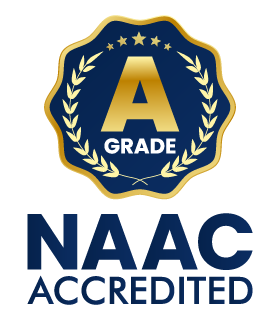About Department
Vision & Mission
Objectives
A PostGraduate Diploma in the Medical Laboratory Technology (PGDMLT) program is designed to meet the increasing demand for proficient medical laboratory technicians within the healthcare sector through experiential learning. The program's objectives included providing skill-oriented training to cultivate qualified professionals capable of operating in diverse healthcare environments, offering practical experience with automated instruments and Laboratory Information Management Software, enhancing students' soft skills, and developing proficiency in a broad spectrum of laboratory services. Furthermore, the program emphasizes the development of administrative skills related to quality assurance, continuous improvement, laboratory education, financial resource management, and maintaining composure.
Graduate Attributes
-
Core Competence: Demonstrates advanced knowledge, critical thinking, research proficiency, and communication in their field by understanding complex concepts and theories, analyze information critically, and develop solutions to problems.
-
Transferable Global & Impactful Societal Skills: Demonstrates cultural intelligence and global awareness in diverse environments. Addresses global challenges sustainably, makes ethical decisions, and collaborates across disciplines.
-
Adaptability and Resilience: Adapts to new technologies and work environments. Shows flexibility in problem-solving and decision-making. Manages stress effectively and perseveres through challenges. Seeks growth opportunities.
-
Sense of Purpose & Curiosity:Shows passion for lifelong learning and self-improvement. Demonstrates intellectual curiosity and innovation. Seeks new perspectives. Aligns personal goals with organizational objectives. Engages in cross-disciplinary learning and seeks feedback for improvement.
-
Ethics & Life-long Immersive Learning: Uphold ethical standards, maintain patient confidentiality, and ensure accuracy in diagnostics. They will engage in continuous learning to stay current with advancements in medical laboratory science and contribute responsibly to healthcare.
Program Educational Outcomes
PEO1 Depth and Breadth of Knowledge: A deep understanding of their field and a broad perspective, integrating knowledge from diverse areas to creatively and ethically tackle complex problems.
PEO2 Practice, Operation and Usage of Modern Tools and Technology: Will contribute in the field of clinical laboratory and healthcare industries in designing, developing and providing solutions for product/processes/technology development.
PEO3 Research, Numeracy and Scholarship: Developing critical thinking, analytical skills, research aptitude, adaptability, ethical standards, effective communication, leadership qualities, interdisciplinary collaboration, career advancement in medical laboratory technology, and patient rights.
PEO4 Professional Capacity and Passion of Learning: Stays modernized of new developments and prepared to acquire, use and integrate them and are flexible and adaptable in different work
PEO5 Global, Moral and Aesthetic Sustainability: will possess a comprehensive understanding of global systems, ethical standards, aesthetic values, adaptability, leadership, and communication skills, contributing to society's advancement and environmental preservation
Program Outcomes
-
Domain knowledge: Demonstrate technical skills, professional expertise and social behavior, imperative upon a medical laboratory technician Problem analysis: Involves diagnosing the gap analysis, evaluation of the results in cutting edge medical issues.
-
Conduct investigations of complex problems: Apply analytical and problem solving techniques for verifying the accuracy of laboratory results, identification of procedural errors, instrument malfunctions and its correction.
-
Modern tool usage: Operate and maintain laboratory equipments utilizing appropriate quality control and safety procedures. Environment and sustainability: Demonstrate ability to plan and implement professional actions by applying suitable components and processes within the safety constraints for environmental and societal needs.
-
Ethics: Understand professional and ethical responsibility in medical lab technology practices Individual and team work: Exhibit leadership quality and teamwork skills in the diverse professional areas.
-
Effective Communication: Communicate effectively by oral, written and graphical means along with digital and information literacy Self-directed and Life-long learning: Recognize the need to engage in lifelong learning through continuing education and research
Program Specific Outcomes
PSO1: Carry out regular lab tests and procedures in blood studies, chemistry, blood banking, and germs study. Do this in hospital labs and diagnostic labs, ensuring good quality control.
PSO2: Conduct well-designed research experiments efficiently, ensuring accurate analysis and interpretation of clinical data to enhance appropriate treatment, patient safety, and organizational proficiency.
PSO3: Follow safety rules and quality standards in medical labs.
PSO4: Leverage information management systems to ensure timely and accurate reporting of laboratory data. Foster leadership and management skills through strategic planning.
Faculty profile



Nutan Prakash Vishwakarma
Associate Professor
M.Sc., M.Phill., Ph.D.
Exp:17






Chitra Bhattacharya
Assistant Professor
M.Sc., M.Phil., Ph.D.
Exp:13


.jpg)








Scope
Research and Publication
Dr. Krishna Joshi
List of Publications:
- Screening and Isolation of Plant Growth-Promoting Bacteria from Forest and Coastal Regions of Saurashtra, Gujarat (2021). Biosc. Biotech.Res.Comm. 14(1). http://dx.doi.org/10.21786/bbrc/14.1/58
- Study of Micronutrients and Macronutrients in Soils of Coastal and Gir Forest Region of Saurashtra,Gujarat, Environment and Ecology 39 (2) : 473—481, April—June 2021 ISSN 0970-0420.
- Effect of Growth-promoting Bacterial Consortia on Overall Growth of Tomato Plants, Appl Biochem Microbiol 59, 511–521 (2023). https://doi.org/10.1134/S0003683823040105
- Characterization of Plant Growth-Promoting Activity of Bacteria Isolated from Forest and Coastal Regions of Saurashtra, Gujarat, India, Biosc. Biotech.Res.Comm.2022; 15(1). http://dx.doi.org/10.21786/bbrc//15.1.22
- Amelioration of growth of maize (Zea mays L.) seedling using plant growth promoting nbacteria. Plant Science Today, 11(2). (Original work published April 1, 2024) https://doi.org/10.14719/pst.3223
Dr. Rohan Pandya
List of Publications:
- Larvicidal proficiency of volatile compounds present in Commiphora wightii gum extract against Aedes aegypti (Linnaeus, 1762), Frontiers in Plant Science, 2023 https://www.frontiersin.org/journals/plant-science/articles/10.3389/fpls.2023.1220339/full
- A Comparative Analysis of the Physico-Chemical Properties of Pectin Isolated from the Peels of Seven Different Citrus Fruits, Gels, 2023 https://www.mdpi.com/2310-2861/9/11/908
- Anti-proliferative activity of surfactins on human cancer cells and their potential use in therapeutics, Peptides, 2022 https://www.sciencedirect.com/science/article/abs/pii/S0196978122001024?via%3Dihub
- Characterization of Bioactive Metabolites from Marine Macroalgae Collected from Veraval Coast of Gujarat, International Journal of Pharmaceutical Sciences and Research, 2022 https://ijpsr.com/bft-article/characterization-of-bioactive-metabolites-from-marine-macroalgae-collected-from-veraval-coast-of-gujarat/
- Physiological Functions of Phenolic Compounds in Plant Defense System, In Intech open - Phenolic compound, 2022 https://www.intechopen.com/chapters/79458
- A comparative account on biodiesel production from forest seeds, In Biofuel from Microbes and Plants Green Energy Alternative, 2022 https://www.taylorfrancis.com/chapters/edit/10.1201/9780429262975-5/comparative-account-biodiesel-production-forest-seeds-jigna-tank-rohan-pandya
- "Conference proceeding-Effect of spermine and putrescine on germination and growth of Vigna radiate (L.) R. Wilczek seeds, SSRN, 2020. https://papers.ssrn.com/sol3/papers.cfm?abstract_id=3585124
- Alkaloids and Phenols Accumulation in Growing Leaf Cells of Gymnospora Montana (Roth) Benth. Biochemical and Cellular Archives, 2019. https://connectjournals.com/pages/articledetails/toc031194
- Foldscope: A primary tool for detection of bioactive compounds in plant cells, In Foldscope and its application, 2019 https://www.researchgate.net/profile/Arun-Dev-Sharma/publication/338884371_Foldscope_and_its _ Applications /links/5e310c9692851c7f7f08cd0a/Foldscope-and-its-Applications.pdf
List of Projects undertaken
- Empowering Youth for Undertaking Value Added Innovative Translational Research (EYUVA) funded by Biotechnology Industry Research Assistance Council (BIRAC), Department of Biotechnology (DBT), Government of India
- "Development of quality biofertilizer using cow dung: Metagenomic studies of Gir and Kankrej breed" funded by Indian Knowledge System Division, Ministry of Education, Government of India
- Biochemical and Molecular Studies of Agarase from Marine Bacteria Isolated from Saurashtra Coast, India funded by Atmiya University, Rajkot
- Preparation of natural polymer based formulations funded by Atal Incubation Centre, Gujarat Technological University
Dr. Abhijeet S. Joshi
List of Publications:
- Indian patent on “Skin Microbiome Analyzer Device”
- Quantification of Metagenomic DNA. In Methods and Protocols in Food Science. Springer US. 2024; 237–241.https://doi.org/10.1007/978-1-
0716-4180-4_29 - Changes of microbiome in response to supplements with silver nanoparticles in cotton rhizosphere. J Basic Microbiol. 2023; 63: 1451–1463. https://doi.org/10.1002/jobm.202300275
- Growth Promoting Impact of Biosynthesised Silver Nanoparticles (AgNPs) on Gossypium hirsutum and Vigna radiata, Proceedings of the National Conference on Innovations in Biological Sciences (NCIBS) https://papers.ssrn.com/sol3/papers.cfm?abstract_id=3582387
- Complete genome sequence of plant growth promoting Pseudomonas aeruginosa AJ D 2 an isolate from monocropic cotton rhizosphere, Genomics, Volume 112, Issue 2, 2020, 1318. https://doi.org/10.1016/j.ygeno.2019.07.022
- Antagonistic potential of silver nanoparticles with ectorhizospheric Pseudomonas species of Bt cotton, JETIR, Volume 5, Issue 112, 2018, 649-664. https://www.jetir.org/papers/JETIR1812493.pdf
- Metabolic Diversity of Rhizospheric Pseudomonas species of Bt Cotton Plant, J Pure Appl Microbiol., 2018; 12(4):1929-1937. http://dx.doi.org/10.22207/JPAM.12.4.29
- Metagenomic Insights into Ecosystems and Environmental Dynamics- Genomic Intelligence: Metagenomics and Artificial Intelligence, 2024. https://www.taylorfrancis.com/chapters/edit/10.1201/9781003570233-3/techniques-metagenomic-data-collection-sequencing-abhijeet-joshi-alla-devivaraprasad-reddy-roshan-maroti-shinde-somesh-mehra-sheetanshu-gupta?context=ubx&refId=cb396c32-5f6d-4043-9ab5-1ab8c7f1e73b
- Techniques for Metagenomic Data Collection and Sequencing. https://www.taylorfrancis.com/chapters/edit/10.1201/9781003570233-11/metagenomic-insights-ecosystems-environmental-dynamics-abhijeet-joshi-sheetanshu-gupta-sugandha-mishra-dhirendra-kumar?context=ubx&refId=06824e17-be27-4ccf-bea4-cca2fca33e48
List of Projects undertaken
- Development of quality biofertilizer using cow dung: Metagenomic studies of Gir and Kankrej breed funded by Indian Knowledge System Division, Ministry of Education, Government of India
- Diabetic kit for sugar level monitoring in diabetic patients funded by Student Startup and Innovation Policy (SSIP 2.0) , Government of Gujarat
- Formulation of Plant Growth Promoter on food waste funded by Student Startup and Innovation Policy (SSIP 2.0) , Government of Gujarat
- Kit for sugar detection in urine sample of diabetic patients funded by Gujarat State Biotechnology Mission, Govt. of Gujarat.
Dr. Mousumi Das
List of Publications:
- Design Patent published and granted “Airborne Microbial Sampler”
- In vitro Study of Antagonistic Activity, Extraction and Optimization of Amylase Enzyme from Trichoderma Harzianum Against Selected Soil borne Fungal Isolates. Science and Technology Journal. 2020, 10(1):16-28. ISSN: 2321-3388.
- Understanding Plant Growth Promoting Rhizobacteria(PGPR) interactions for inducing plant defences; In a book: Novel Approaches In Science and Pharma Fraternity. P.K . Publishers and Distributors, New Delhi, India. ISBN: 978-93-92239-66-3:Pp:12-27
- Microbial Biomaterials and Their Industrial Applications. In a Book Entitled Microbial products for future industrialization. Ediotors : Angana Sarkar, Idris Adewale Ahmed. 2023, 10.1007/978-981-99-1737-2_15.
- Prevalence of Antimicrobial Resistance in Saurashtra, Gujarat and Implications Toward Sustainable Healthcare. Indian J Microbiol. 2024. https://doi.org/10.1007/s12088-024-01209-6
- Actinomycetes as a Possible Source of Bioremediation of Heavy Metal Cadmium from Contaminated Soil. Current World Environment Journal. 2024, 19I1). ISSN:0973-4929
- Screening, Production and Characterization of Potential Lignocellulolytic Actinomycetes from Agricultural Field. Journal of Pure and Applied Microbiology. 2024, 18 (2).1336-1346."
- Effect of Siderophore Producing Cadmium Tolerant Streptomyces pactum OR958669 on Plant Growth of Groundnut (Arachis hypogaea L.). Current Agriculture Research Journal. 2024, 12(1).485-495.
List of Projects undertaken
- Wrap Eat - SSIP, Atmiya University, Rajkot funded by KCST, Gujarat
- Agronomics - SSIP, Atmiya University, Rajkot funded by KCST, Gujarat
- IKS - BJS1_M27- Vedic Science a Domestic Approach Solving Water pollution - A Menace funded by IKS, AICTE, Govt of India, MoE
- IKS- BJS1_M27- Demystifying the drinking water microflora by Copper vessel storage and Agnihotra ash treatment funded by IKS, AICTE, Govt of India, MoE
- Atal FDP Grant of 1.0 lakh for conducting Six day Online FDP in the year 2025 by ATAL, AICTE, Govt of India
Dr. Chitra Bhattacharya
List of Publications:
- Indian Patent on "Image Processing Based Approach Integrated with Deep Learning to Accurately Detect the Root Cause for Disease and Factors Responsible for Decrease In Crop Yield Application No.202211040082 A"
- Design Patent Published on “Nanoparticle Synthesis Apparatus for Liquid Waste Treatment”
- Exploration of Saurashtra Soil PGPR Strain and its Attributes in Crop Productivity by Pot Plant Study Eco. Env. & Cons. 29 (May Suppl. Issue) : 2023; pp. (S191-S196)
- Isolation and identification of PGPR traits from soil samples of the saurashtra region. Indian J.Sci.Res. 13 (2): 13-21, 2023
- Book chapter “Design and Operation of New Microbial Product Bioprocessing System” Springer (ISBN -978-981-99-1737-2)"
- Book chapter "Microbial Biomaterials and Their Industrial Applications Springer(ISBN - 978-981-99-1737-2)"
- Book chapter "Understanding Plant-Plant Growth Promoting Rhizobacteria (PGPR) Interactions for Inducing Plant Defenses (ISBN- 978-93-92239-66-3), P.K. Publishers & Distributors"
- Book chapter "Application of Microbial Technology for Waste Removal Springer Nature Singapore Pte Ltd (ISBN- 978-981-16-3840-4)"
- Book chapter "Effect of Ageing on Biochemical Parameters in Sesame Seed At LAP LAMBERT Academic Publishing, Germany (ISBN- 978-3-659-27112-0)"
- Screening of Bacillus sp. (OQ654027) Mediated Seed Bio-Priming Enhance Plant-Growth-Promotion for Sustainable Crop Production of Groundnut and Chickpea, Current Agriculture Research Journal, Vol. 11, No. (3) 2023, pg.1-18. (UGC approved/ WoS) ISSN: 2347-4688
List of Projects undertaken
- Development of Bacto-fungal Consortium and Study of Biological Attributes in Organic Farming Practice funded by SEED Money project, Atmiya University, Rajkot
- Formulation of Melishield Fragment Mosquito Repellent. funded by SSIP (State-Level Student Start up Innovation Policy)
- Melishield Mosquito Repellent funded by E-Yuva, DBT, BIRAC
- Formulation of Herbal Mosquito Repellent funded by E-Yuva, DBT, BIRAC
- State Level 7 Days Short Term Training Program on "Enzyme Assay & Kinetics" Funded by DST and Gujarat State Biotechnology Mission (GSBTM)
Dr. Bhargav Waghela
List of Publication:
- Identification of novel exonic variants contributing to hereditary breast and ovarian cancer in west Indian population. Gene, 2023.
- Insights of Endocytosis Signaling in Health and Disease. International Journal of Molecular Sciences, 2023.
- Upregulation of NOX-2 and Nrf-2 promotes 5-Fluorouracil-resistance of human colon carcinoma (HCT-116) cells. Biochemistry (Moscow), 2021.
- AGE-RAGE synergy influences programmed cell death signaling to promote cancer. Molecular and Cellular Biochemistry, 2020.
- Molecular insights of NADPH oxidases and its pathological consequences. Cell Biochemistry and Function, 2020.
- Inhibition of NADPH Oxidase activity augments 5-fluorouracil mediated cell death in human colon carcinoma HCT-116 cells. Int. J. Adv. Res. 8(07), 865-874, 2020.
- Curcumin Conjugated with PLGA Potentiates Sustainability, Anti-Proliferative Activity and Apoptosis in Human Colon Carcinoma Cells. PloS One, 10 (2), e0117526, 2015. (Top 25% Most Cited articles of 2015 in Plos One)
- RP‐HPLC method development, validation, and its pharmacokinetic applicability in preclinical evaluation of rhein treated with novel diacerein eutectics. Biomedical Chromatography, 2022.
- Molecular Diagnosis of Muscular Dystrophy Patients in Western Indian Population: A Comprehensive Mutation Analysis Using Amplicon Sequencing. Frontiers in genetics, 2021.
- Cell-Penetrable Peptide-Conjugated FADD Induces Apoptosis and Regulates Inflammatory Signaling in Cancer Cells. Int. J. Mol. Sci., 2020.
- Surface modified PAMAM dendrimers with gallic acid inhibit, cell proliferation, cell migration and inflammatory response to augment apoptotic cell death in human colon carcinoma cells. Journal of Biomolecular Structure and Dynamics, 2020.
- Evaluation of antimitotic activity of herbal extracts using plant‐based model systems and their cytotoxic potential against human colon carcinoma cells. Journal of Cancer Research and Therapeutics, 2021.
- Leishmania donovani adenylate kinase 2a prevents ATP-mediated cell cytolysis in macrophages. Parasitology International, 2019.
- Silibinin, A Natural Blend In Polytherapy Formulation For Targeting Cd44v6 Expressing Colon Cancer Stem Cells. Scientific Reports, 2018.
- Synthesis, characterization and biological application of 5-quinoline 1, 3, 5-trisubstituted pyrazole based platinum (ii) complexes. MedChemComm. 2018.
- Design, synthesis, pharmacological evaluation and DNA interaction studies of binuclear Pt (II) complexes with pyrazolo [1, 5‐a] pyrimidine scaffold. Applied Organometallic Chemistry, 2018.
- Design, synthesis, MTT assay, DNA interaction studies of platinum(II) complexes. Journal of Biomolecular Structure & Dynamics, 1-18, 2017.
- Quercetin Protects Necrotic Insult and Promotes Apoptosis by Attenuating the Expression of RAGE and its ligand HMGB1 in Human Breast Adenocarcinoma cells. IUBMB Life, 67 (5), 361-373, 2015.
- Advanced Glycation End Products mediated oxidative stress and regulated cell death signalling in cancer. Handbook of Oxidative Stress and Cancer, 2020.
- Effect of Sucrose Concentration on In-vitro growth of Mustard Seedlings. Phytotechnology: Emerging Trends, Chapter-33, 2009.
Dr. Nidhi Saxena
List of Publication:
- Characterization and probiotic assessment of Lactobacillus isolates from Saurashtra, Gujarat, India. Applied Biochemistry and Microbiology. 2025, 61(2): 01-10. https://doi.org/10.1134/S000368382460698X
- Role of dietary natural food as a therapeutic drug to prevent lung cancer: Phytochemicals as an Epigenetic Modifier in Cancer Prevention, Chapter-4, IOP Publishing, 2023, 4-1 to 4-39. https://dx.doi.org/10.1088/978-0-7503-5252-9ch4
- Bacterial Decolorization of Reactive Red: Strategic Bioremediation of Textile Dye. International Journal of Current Microbiology and Applied Science. 2018, 7(9): 147-156. https://doi.org/10.20546/ijcmas.2018.709.019
- Factors affecting in vitro propagation of bacopa monniera, The Global Journal of Multidisciplinary Studies, 2016 (5).
- Conventional method for saponin extraction from chlorophytum borivilianum Sant. Et Fernand, Global J Res. Med. Plants & Indigen. Med., 2014, Volume 3(2): 33–39
List of Projects undertaken
- Mushroom Cultivation (Mushroom source of high protein)- SSIP, Atmiya University, Rajkot funded by KCST, Gujarat
- Influencing Gut Microbiota to reduce Malnutrition in Gujarat region funded by SEED Money project, Atmiya University, Rajkot
Dr. Shivani Tank
List of Publication:
- Appraisal of Organic and Inorganic Nanomaterials in Cellular Microenvironment ISBN: 9780367271824,0367271826"
- Development and Characterisation of Ayurvedic Polyherbal Formulation for Diabetic Wound Healing: A Comprehensive Study on Decoction, Phytochemical Analysis, and Topical Application. J Biomed Eng Res. 2023. 7: 1-17
List of Projects undertaken
- Development and characterization of ayurvedic polyherbal formulation for diabetic wound healing funded by SEED Money project, Atmiya University, Rajkot
Dr. Hitarth B. Bhatt
List of Publication:
- Extremozymes: characteristics, structure, protein engineering and applications. Frontiers in Microbiology. 2024 May 8;15:1423463. https://doi.org/10.3389/fmicb.2024.1423463
- Solvent tolerant enzymes in Extremophiles: Adaptations and Applications. International Journal of Biological Macromolecules. 2023. https://doi.org/10.1016/j.ijbiomac.2023.124051
- Diversity of Cultivable Bacteria in A Saline Desert ofLittle Rann of Kutch, India: A Phylogenetic Perspective. Frontiers in Marine Science. 2022. 9:769043. https://doi.org/10.3389/fmars.2022.769043
- Phenotypic characteristics, phylogenetic analysis and characterization of alkaline proteases of marine bacteria Geomicrobium halophilum, Oceanobacillus oncorhynchi, and Oceanobacillus khimchii. Biologia. 2022. https://doi.org/10.1007/s11756-022-01095-7
- Cloning, Expression and Structural Elucidation of a Biotechnologically Potential Alkaline Serine Protease from A Newly Isolated Haloalkaliphilic Bacillus lehensis JO-26. Frontiers in Microbiology. June 3 2020; 11: 941. https://doi.org/10.3389/fmicb.2020.00941
- Phylogeny, novel bacterial lineage and enzymatic potential of haloalkaliphilic bacteria from the saline coastal desert of Little Rann of Kutch, Gujarat, India. 3 Biotech. 2018 Jan 1;8(1):53. https://doi.org/10.1007/s13205-017-1075-0
- Desertibacillus haloalkaliphilus gen. nov., sp. nov., isolated from a saline desert. International journal of systematic and evolutionary microbiology. Sep 21 2017;67(11):4435-42. https://doi.org/10.1099/ijsem.0.002310
- Cloning, heterologous expression and structural characterization of an alkaline serine protease from sea water haloalkaliphilic bacterium. Annals of microbiology. Mar 1 2015; 65 (1): 371- 81. https://doi.org/10.1007/s13213-014-0869-0
- Effect of Salt and pH on the Growth and Production of Alkaline Proteases From Haloalkaliphilic Bacteria Isolated From Saline Desert https://papers.ssrn.com/sol3/papers.cfm?abstract_id=3576594
- Production and demand of microbial oxidative enzymes worldwide. Microbial Oxidative Enzymes: Biotechnological Applications. Dec 31 2023: 467. https://www.degruyter.com/document/doi/10.1515/9783111062235-023/pdf?licenseType=restricted
- Desertibacillus, Bergey's Manual of Systematics of Archaea and Bacteria. 2022. https://onlinelibrary.wiley.com/doi/abs/10.1002/9781118960608.gbm01788
- Multifunctional properties of polysaccharides produced by halophilic bacteria and their new applications in biotechnology. Microbial Syntrophy-Mediated Eco-enterprising. 2022 https://www.sciencedirect.com/science/article/abs/pii/B9780323999007000146
- Adaptation strategies in halophilic bacteria. Extremophiles: From biology to Biotechnology. 2018 Feb. (CRC Press) https://www.taylorfrancis.com/chapters/edit/10.1201/9781315154695-7/adaptation-strategies-halophilic - bacteria-vikram-raval-hitarth-bhatt-satya-singh
- Phylogenetic and phenogram based diversity of haloalkaliphilic bacteria from the saline desert. Microbial Biotechnology: Technological Challenges and Developmental Trends. 2017 Mar 16:373. (CRC Press) https://www.taylorfrancis.com/chapters/edit/10.1201/b19978-24/phylogenetic-phenogram-based-diversity-haloalkaliphilic-bacteria-saline-desert-hitarth-bhatt-satya-singh
Dr. Vivek B. Pattani
List of Publication:
- Amelioration of growth of maize (Zea mays L.) seedling using plant growth promoting bacteria. Plant Science Today. 2024. 11(2). https://doi.org/10.14719/pst.3223
- Effect of Growth-promoting Bacterial Consortia on Overall Growth of Tomato Plants. Applied Biochemistry and Microbiology. 2023. 59(4), 511-521. https://doi.org/10.1134/S0003683823040105
- Characterization of Plant Growth-Promoting Activity of Bacteria Isolated from Forest and Coastal Regions of Saurashtra, Gujarat, India. Bioscience Biotechnology Research Communications. 2022. 15(1). http://dx.doi.org/10.21786/bbrc//15.1.22
- Screening and Isolation of Plant Growth-Promoting Bacteria from Forest and Coastal Regions of Saurashtra, Gujarat. Biosc. Biotech. Res. Comm., 2021. 14(1), 410-415. http://dx.doi.org/10.21786/bbrc/14.1/58
- Study of Micronutrients and Macronutrients in Soils of Coastal and Gir Forest Region of Saurashtra, Gujarat. Environment and Ecology. 2021. 39(2), 473-481. https://environmentandecology.com/wp-content/uploads/2024/08/MS26.pdf
- Study Of Culturable Microbial Counts And Its Relation With Various Soil Parameters Near Lalparilake, Rajkot. International Journal of Advanced Research. 2016. 4(9), 855-862. https://dx.doi.org/10.21474/IJAR01/1553
Dr. Jinesh Kaneriya
List of Publication:
- Effect of Growth-promoting Bacterial Consortia on Overall Growth of Tomato Plants. Appl Biochem Microbiol 59, 511–521 (2023). https://doi.org/10.1134/S0003683823040105
- Amelioration of growth of maize (Zea mays L.) seedling using plant growth promoting bacteria. Plant Science Today, 2024. 11(2). https://doi.org/10.14719/pst.3223
- Screening and Isolation of Plant Growth-Promoting Bacteria from Forest and Coastal Regions of Saurashtra, Gujarat. Biosc. Biotech.Res.Comm. 2021;14(1). http://dx.doi.org/10.21786/bbrc/14.1/58
- Characterization of Plant Growth-Promoting Activity of Bacteria Isolated from Forest and Coastal Regions of Saurashtra, Gujarat, India. Biosc. Biotech. Res. Comm. 2022; 15(1). http://dx.doi.org/10.21786/bbrc//15.1.22
- Effects of Ultra-Processed Food on Human Gut Microbiota. Journal of Medicine Care and Health Review 1(4). https://doi.org/10.61615/JMCHR/2024/NOV027141102
- Study of Micronutrients and Macronutrients in Soils of Coastal and Gir Forest Region of Saurashtra, Gujarat, Environment and Ecology 39 (2) : 473—481, April—June 2021 ISSN 0970-0420
Dr. Vaishali Majithiya
List of Publication:
- Microorganisms: An essential source of industrial proteases. In Recent Advances in Microbiology. Editor; Kripamoy Chakraborty. Shriyanshi Prakashan. 2023.
- Diversity, Distribution and Biotechnological Potential of Marine Actinobacteria. In Current Trends in Marine Biology. Editors: Vala A.K., Kumar S.K. Cambridge Scholar publications. 2022. UK (pp.184-209).
- Actinobacteria associated with marine invertebrates: Diversity and potential application. In “Actinobacteria” Editor; Hozzein W.N. Intech open. 2022. pp 23-40
- Genetic and Physiological Diversity of Marine Actinobacteria from the Okha Coast, Gujarat, India. Geomicrobiology Journal. 2023, 1-15.
- Isolation and characterization of marine actinobacteria associated with the seaweeds, Codium dwarkense and Sargassum cinereum, collected from the Veraval coastline, Gujarat, India. Journal of Marine Biological Association of India. 2022, 64(1), 33-37.
- Media optimization and purification of alpha amylase from haloalkaliphilic actinobacteria associated with seaweed. Proceedings of International Science Symposium 2022.
- Screening and optimization of Amylase producing actinobacteria associated with sea weed Dictyopteris sp. Proceedings of International Science Symposium 2021.
- Isolation and Screening of Extracellular Enzymes Producing Actinobacteria Associated With Sea Weed (February 29, 2020). Proceedings of the National Conference on Innovations in Biological Sciences (NCIBS) 2020.
Ms. Radhika Joshi
List of Publication:
- Changes of microbiome in response to supplements with silver nanoparticles in cotton rhizosphere. J Basic Microbiol. 2023; 63: 1451–1463. https://doi.org/10.1002/jobm.202300275
Event
| Sr. No. | Event Name | Event Date | Photo Gallery |
|---|---|---|---|
| 1 | Educational Visit - AIIMS, Rajkot | 19-09-2024 | View |
| 2 | Extension Activity - Food Feasta 2024 | 14-09-2024 | View |
| 3 | Phlebotomy Workshop | 07-08-2024 | View |
| 4 | Field Visit - Life Blood Centre, Rajkot | 17-07-2024 | View |
Department Infrastructure
Classrooms
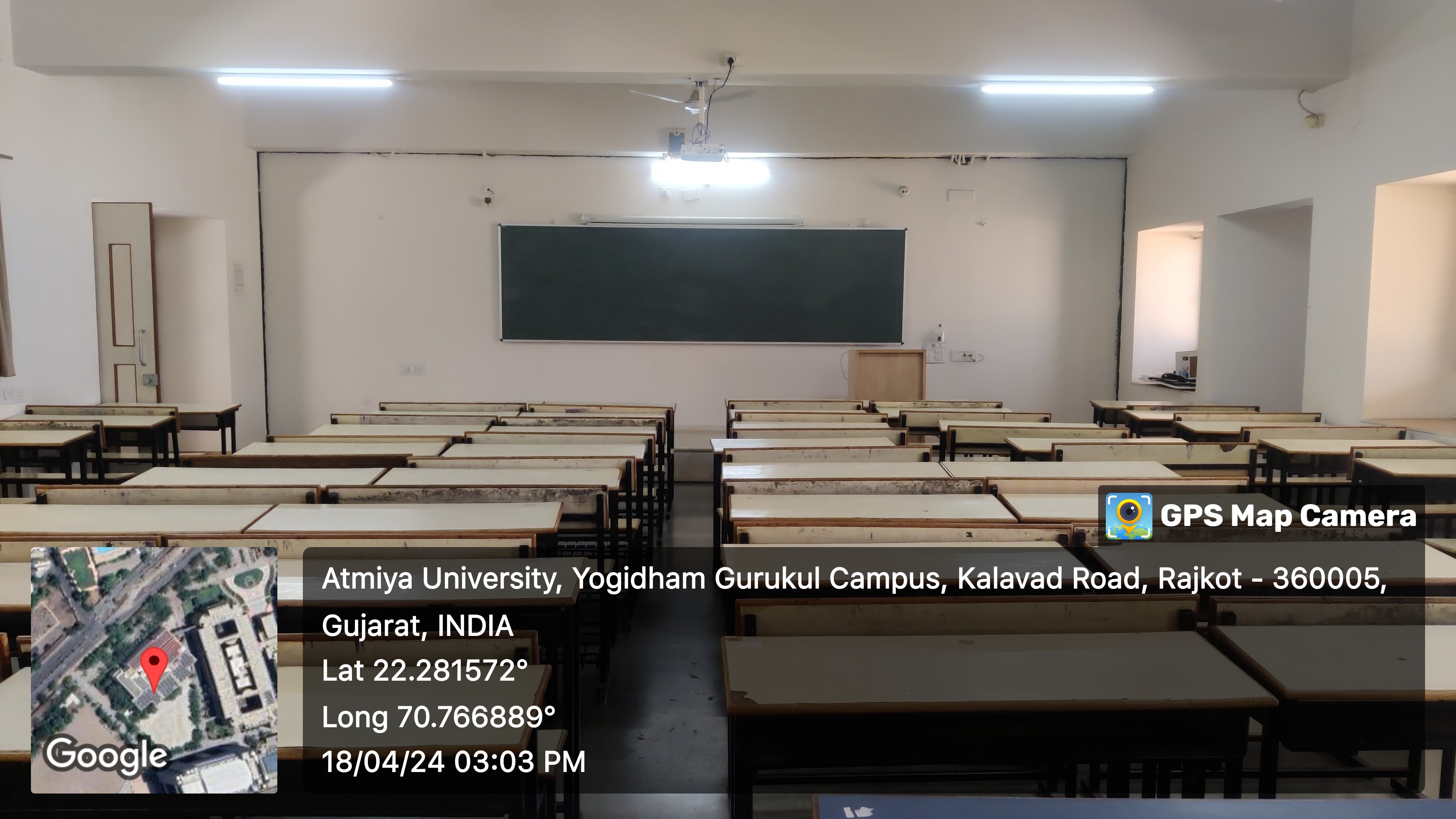
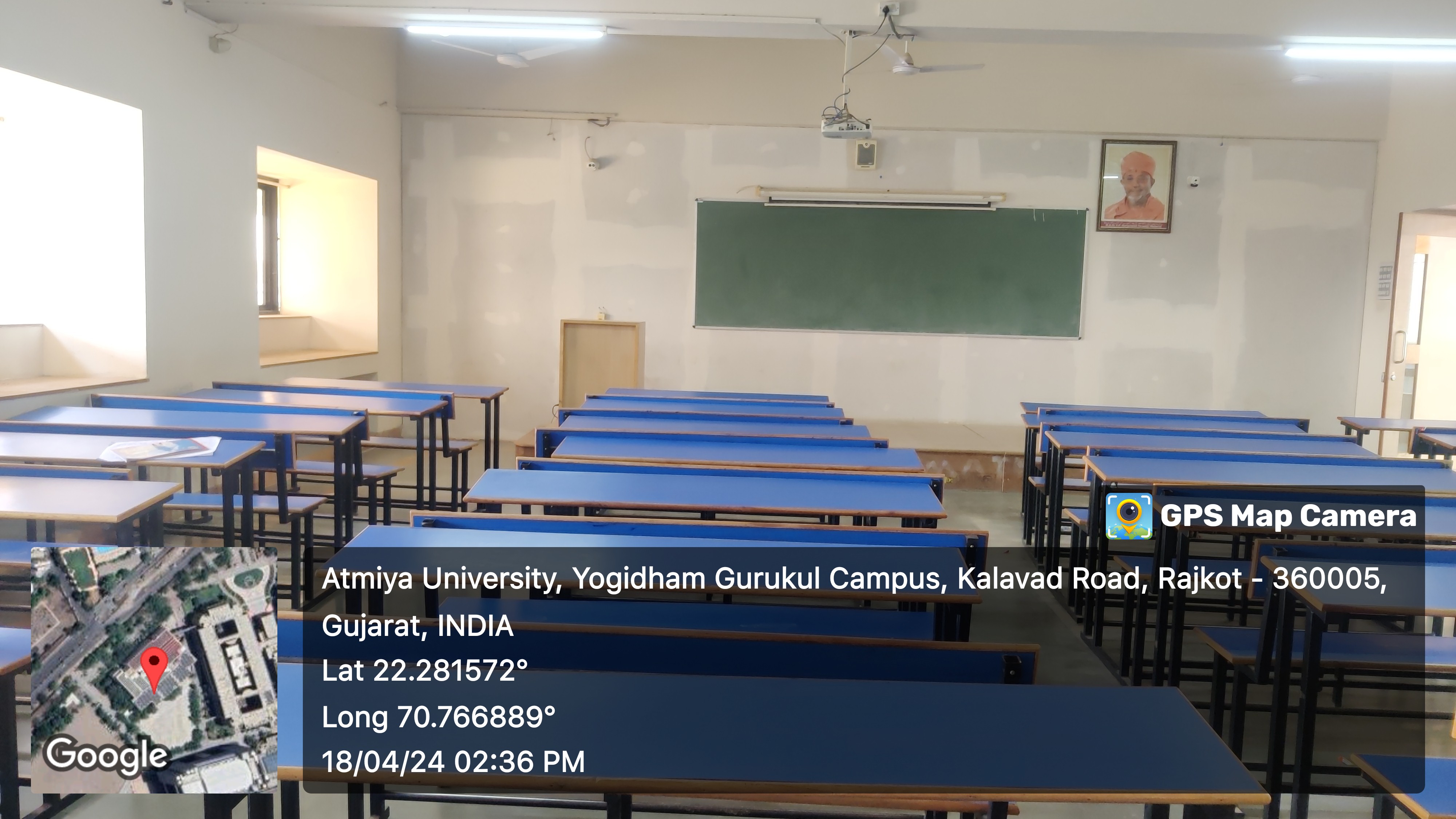
.jpg)
.jpg)
Microbiology Labs
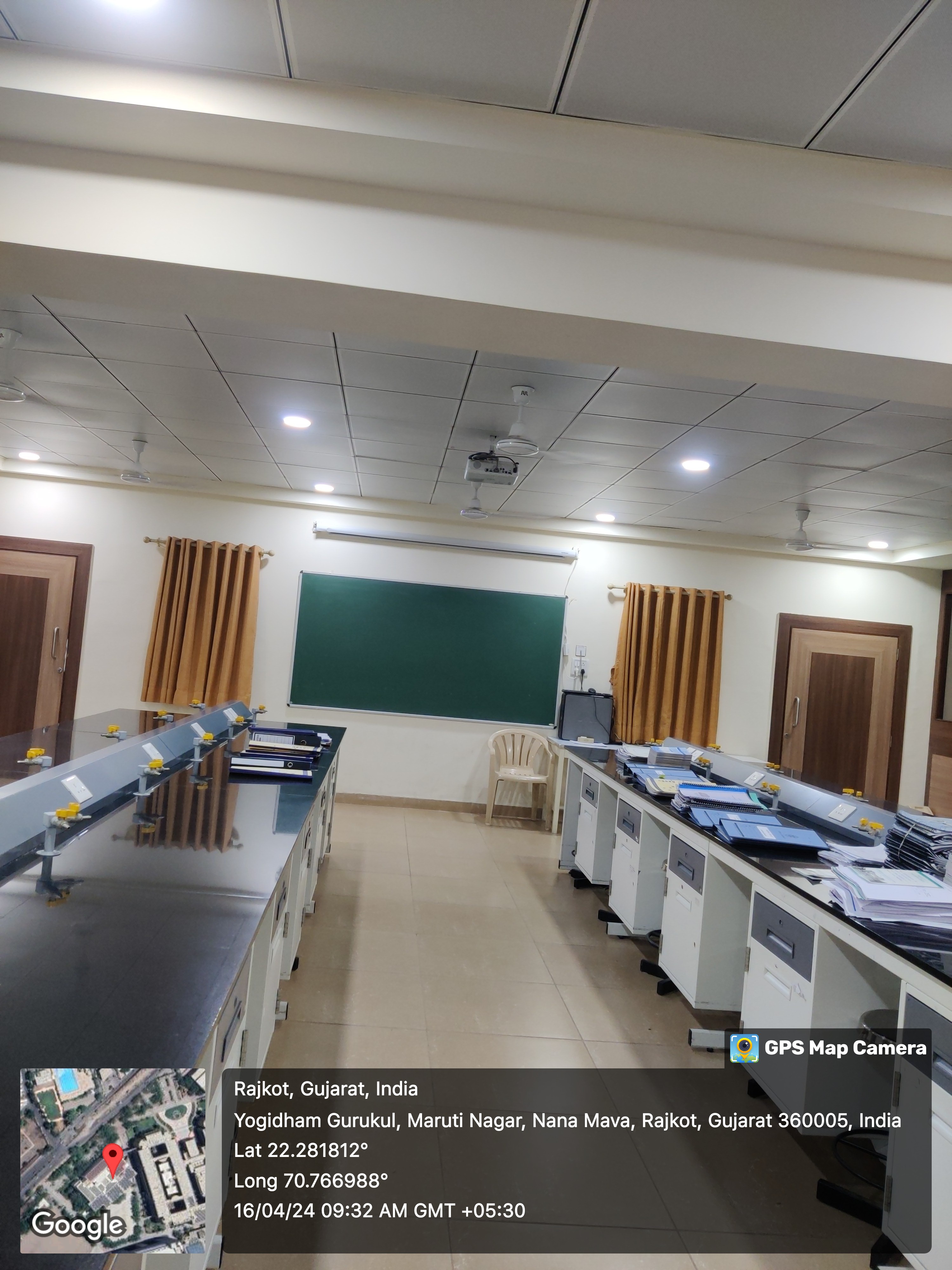
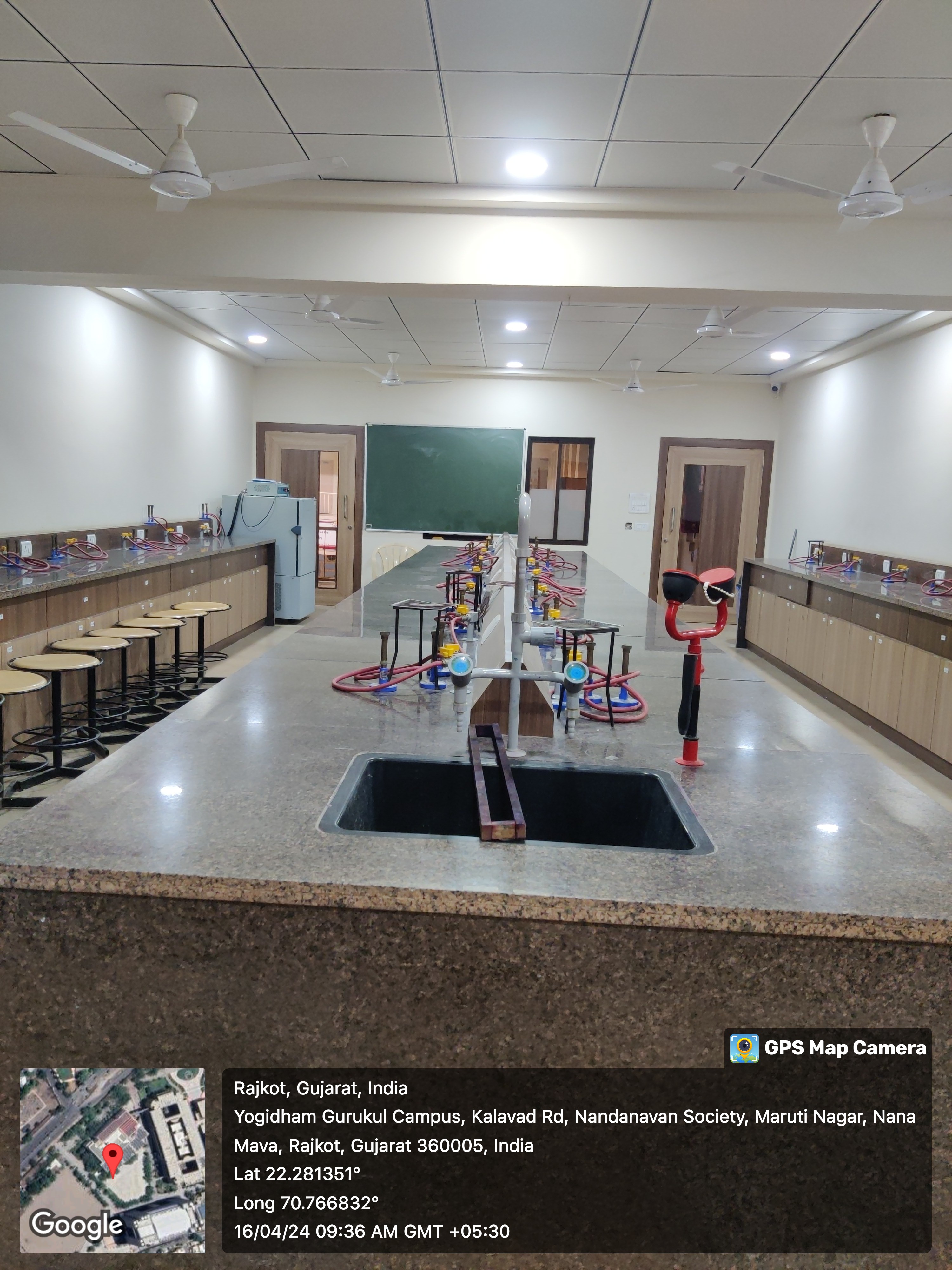
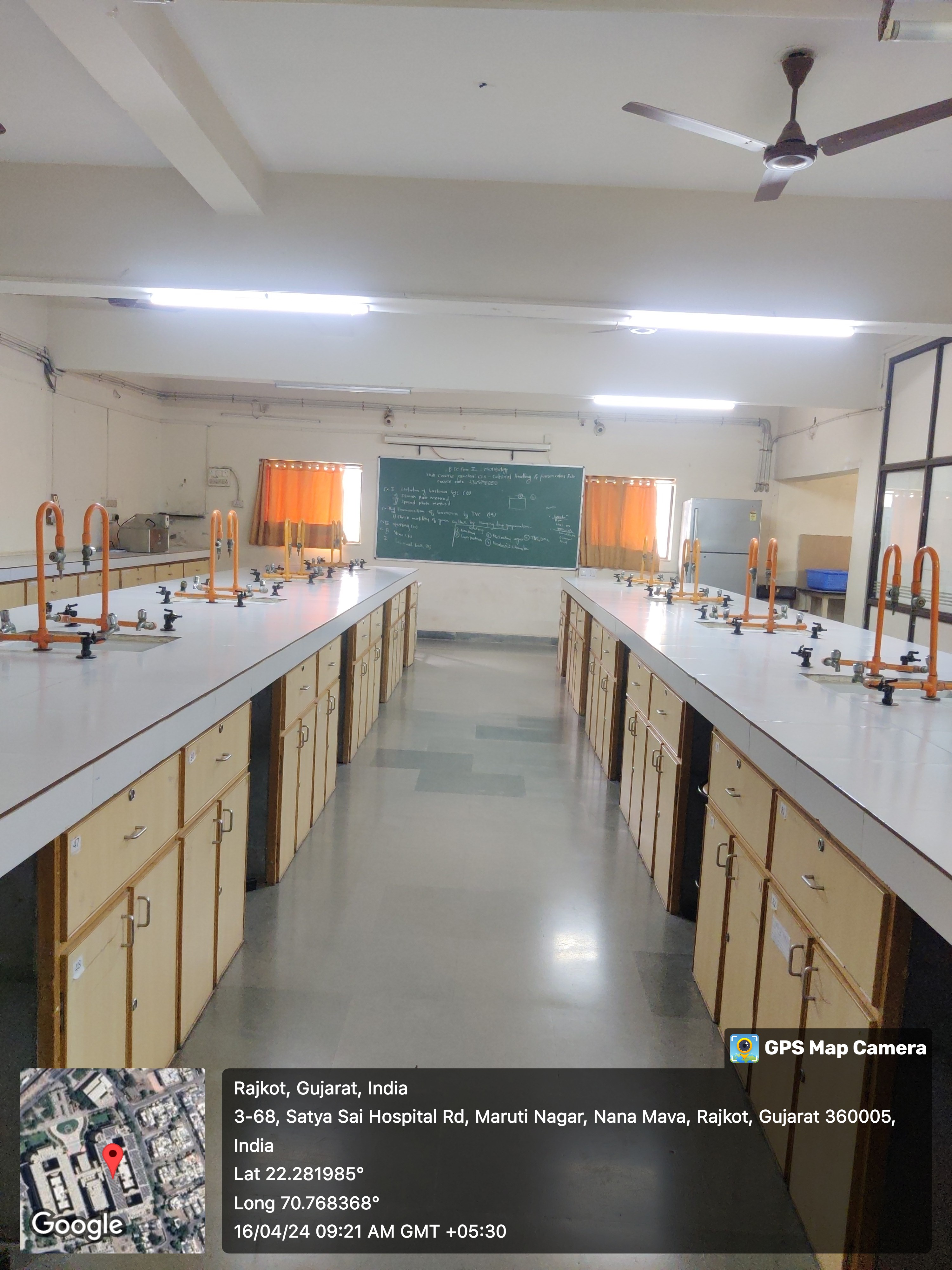
.jpg)
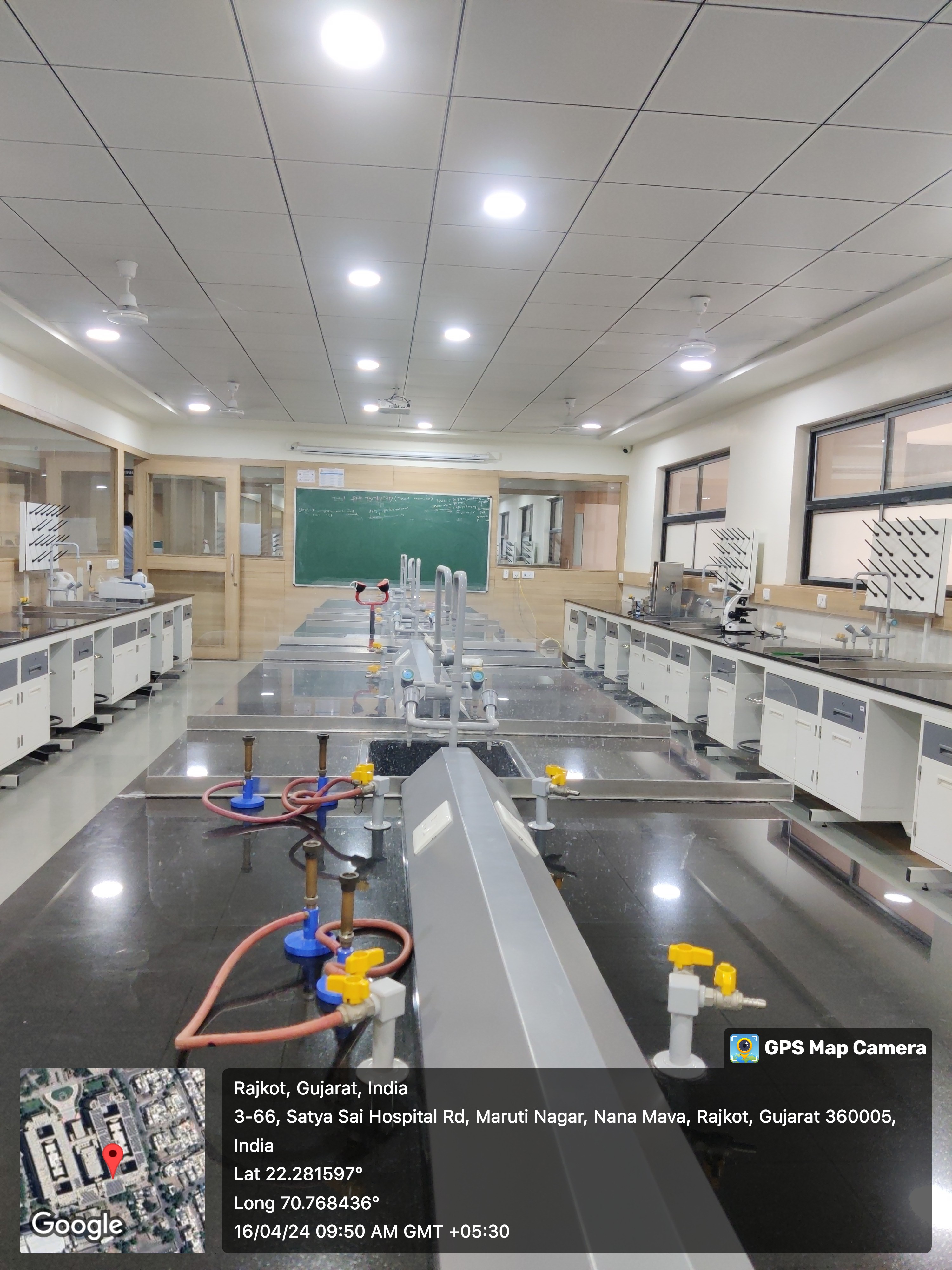
.jpg)
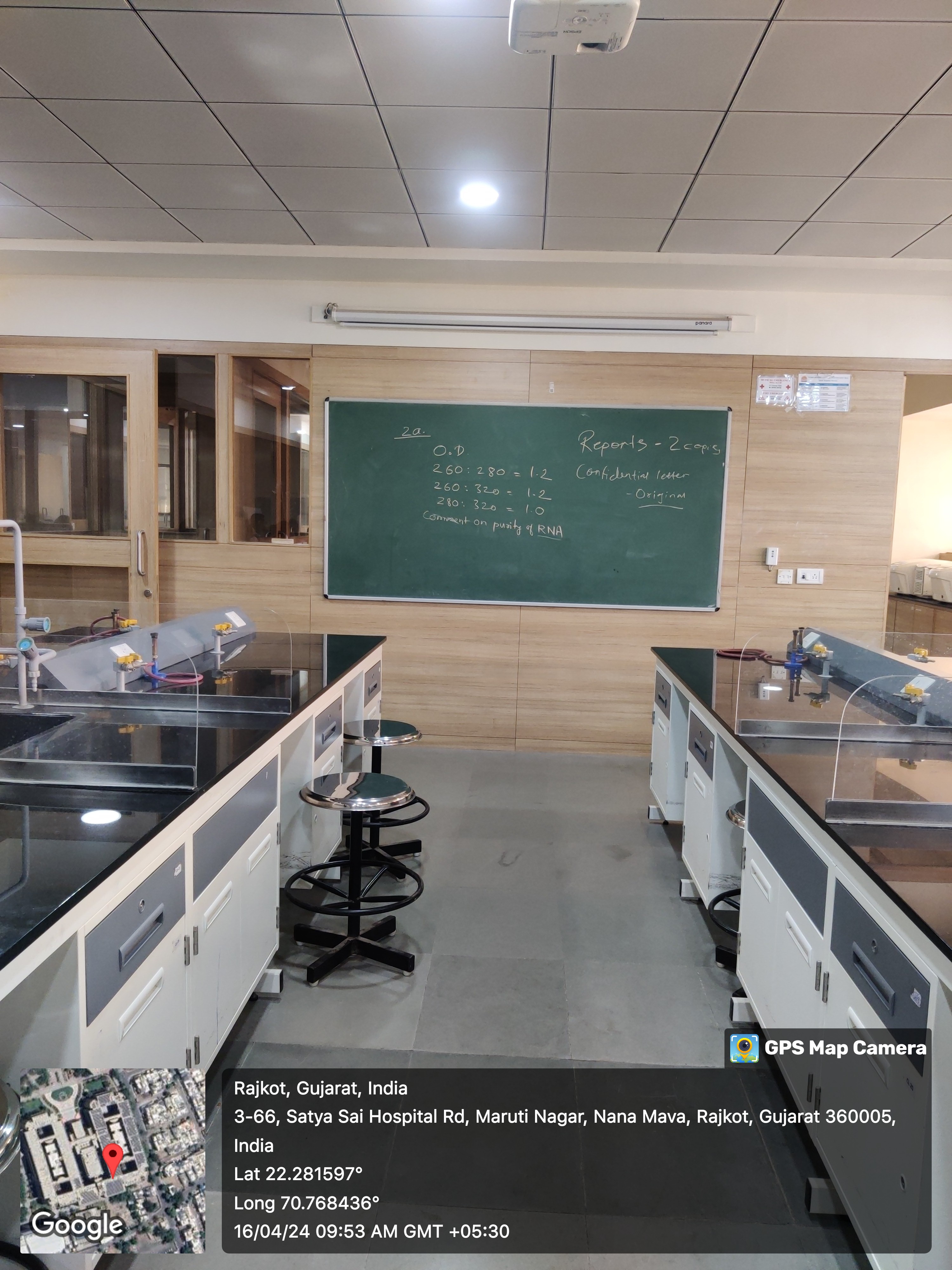
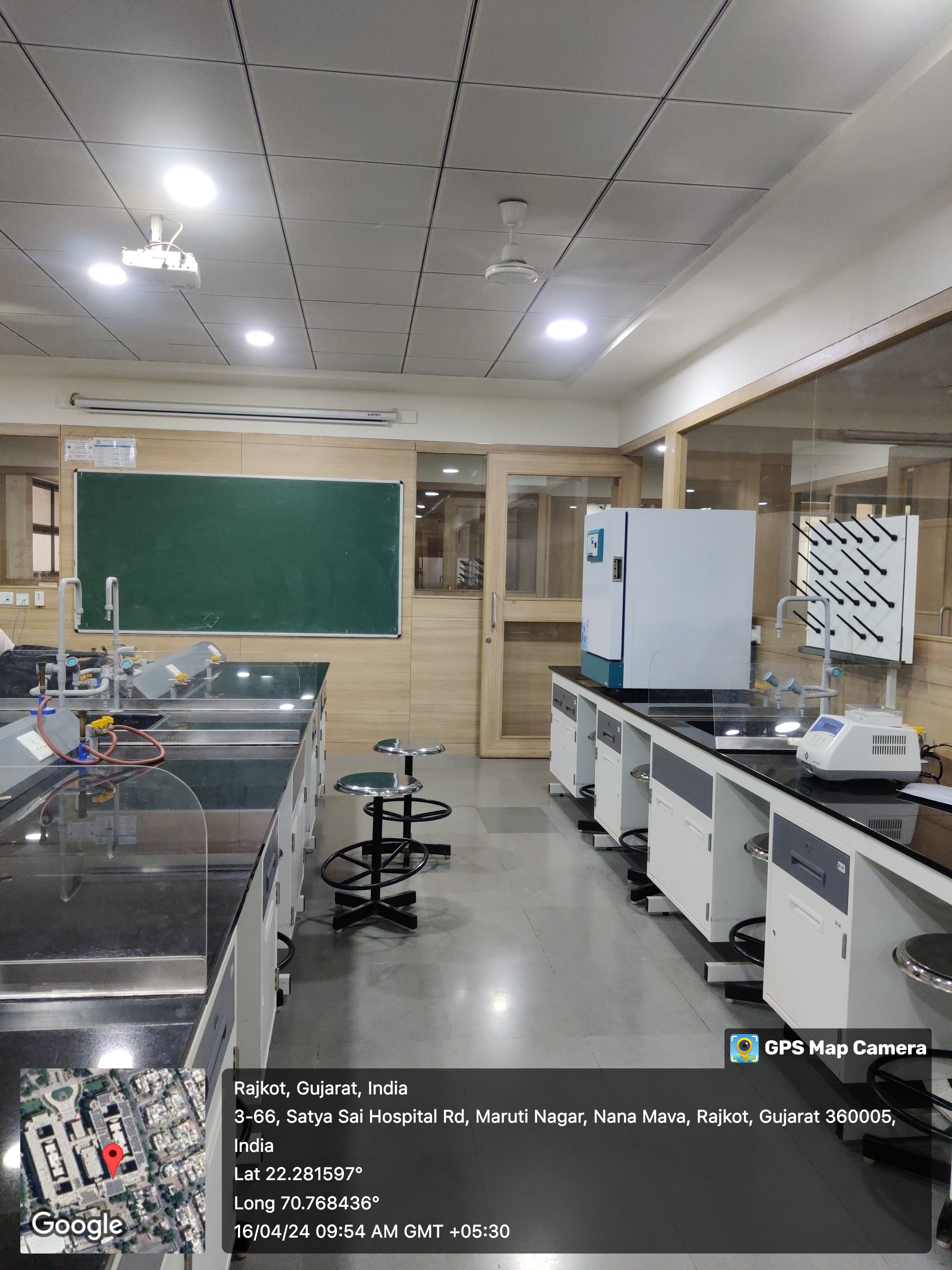
Placement
Achievements
Students achievement:
